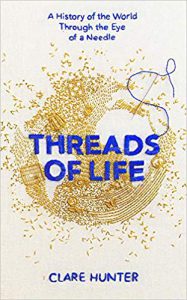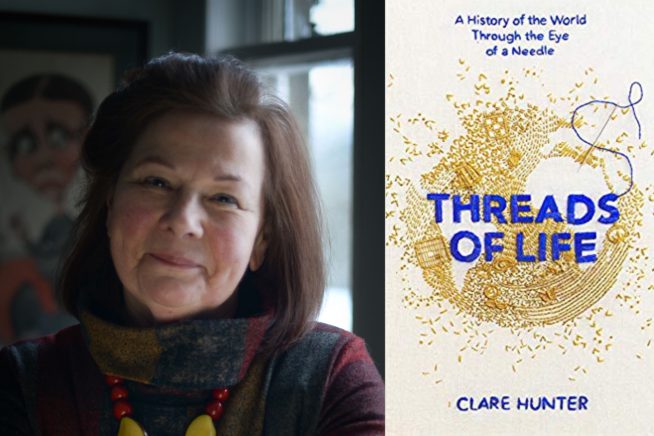
- This event has passed.
- Non-fiction
- SOLD OUT!
Threads of Life – A History of the World Through the Eye of a Needle
This event has sold out.
An eloquent history of the language of sewing over centuries and across continents.
A BBC Radio 4 Book of the Week, Threads of Life is an evocative and moving book about the need we all have to tell our story. It is a chronicle of identity, protest, memory, power and politics told through the stories of the men and women, over centuries and across continents, who have used the language of sewing to make their voices heard, often in the most desperate of circumstances.

THREADS OF LIFE
In Threads of Life Clare Hunter takes us from Mary, Queen of Scots in captivity to the mentally and physically damaged soldiers returning home after World War One, from the grieving mothers of the disappeared in 1970s Argentina to nineteenth century tailors whose pictorial quilts campaigned for reform and feminists in 1980s America, in an evocative and moving book about the need we all have to tell our story.
Sewing is a way to mark our existence on cloth: patterning our place in the world, voicing our identity, sharing something of ourselves with others and leaving the indelible evidence of our presence in stitches held fast by our touch.
For millennia, women and marginalised communities either unable or forbidden to write or speak out for themselves, have used sewing to document their thoughts and experiences and even to transmit subversive messages.
The popularity of sewing, embroidery and ‘making things’ is surging. The Royal School of Needlework reports that their classes are oversubscribed; sewing workshops and blogs, online needlework tutorials and social media networks of sewing enthusiasts are all on the rise.
The link between sewing and improving mental health has been well documented. Clare has worked over many years with people who are the most vulnerable in society – the mentally ill, immigrants, prisoners, the elderly – using sewing as a way to help them tell of their lives and connect with the wider world.
Clare says in writing the book “I wanted to remind readers of needlework’s emotional, social and textural qualities and by doing so, to revive an appreciation of its value.”
‘Threads of Life is a beautifully considered book that reminds us of how much sewing plays a crucial part in expressing the many facets of our lives. Clare Hunter has managed to mix the personal with the political with moving results. Reading it made me pick up my needle with a new perspective.’ Tracy Chevalier
Photo of Clare Hunter © Mel Lewis





